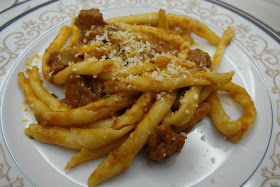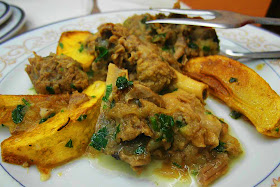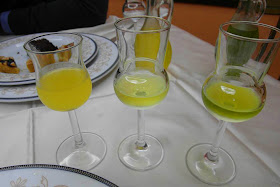I’d been running around with Paolo Librandi, whose family has done so much for the image of wine in Calabria and Italy. It has been raining sheets for a few days and the fishermen weren’t even going out into the sea to gather what they usually would. For that, instead of having dinner at Paolo’s favorite seafood haunt, we headed for the hills.
L’Aquila d’oro is one of those places that most people would drive by. Four tables, seating 18 people, a simple dining room. The owners live above the restaurant. The wife cooks; boy, does she cook. And cook. And cook. The husband and son serve; boy do they serve. And serve. And serve.
Appetizer wise, I lost count at 10. Small plates, little tastes, but they add up. We started with a wine I am very fond of, the Librandi Ciro rosato.
The first platter they served was their home made salumi. I didn’t photograph it. I thought about my chef friend’s back home who would have given their Formula 1 tickets to sit at this table and eat this platter of salumi. Little sausages, flat slices, varying shaded of red and brown. A slice of another cured meat larger, full of flavor. Paolo warned me to pace myself. There would be more.
Focaccia started showing up, first one then another. I gravitated towards the one with peppers and sardines. Spicy, heat, crusty, salty. Perfect for the savory rosato.
The next dish brought by the son, a shy, almost feral boy. Tiny skewers (oregano branches) holding some kind of organ, with this little sheet of wild onion to accompany it. “Take a bite, then I’ll tell you what it is,” Paolo said. How many times have you heard that? “I’m not afraid,” I countered.
It was called stigghiolata. Do you really want to know? Baby goat intestines. I went back for more.
Next, a disk of fresh ricotta, dipped in the freshest of farm eggs, and lightly fried. Savory, salty, fresh, creamy wonderfulness.
More comfort food. A sample of fresh eggs and the supplest of onions and mild, red peppers, cooked runny. I ran back for more.
Wedges of roasted potatoes. Crunchy, warm. I take a bite. Or two. Or three. I’m sunk.
“This is the poorest of cuisines,” Paolo reminded me. I needed no reminding, having seen it years ago in Calabria in my grandmother’s hometown. “This food is made from things nobody in the city hungers for, wild onions, herbs, parts of animals that get discarded, skins of plants no one would think were edible. Throw away food.” More like throw it down food, Paolo. Which we are doing a pretty good job of doing. We would pay in the morning. We would pay. But in the meantime, I thought of my chef friends and my food writer friends, and my wine lover friends and we pressed on in service.
A little plate of mild green and red peppers and octopus, peppers and polipo, appeared. I love octopus, learned to love it in Sicily in the ‘70’s. Rarely have it in the US because I have been disappointed too many times. Not this time. Subtle and supple. No teeth needed to eat it. Not mushy. Not pretty. But memorable.
Yes, these dishes aren’t Savour-magazine picture perfect. But the food coming to this table is another world. We are in the kitchen of a woman from Calabria. I was in déjà vu territory. But this was just the beginning.
A small plate of small wild onion bulbs with red peppers (a little more heat) and savory squash. Vegetables, a universe of choices. If I were to take folks to an “Italian” restaurant back home and serve them this, some of them might ask, “When are we going to start getting the Italian food?” Some of them wouldn’t. They would get this. Boy am I thinking about them tonight.
A trio of items show up; a stuffed eggplant, a stuffed pepper and a flattened sphere, a polpette of some sort. I am thinking the polpette is meat, but no, it’s eggplant and breadcrumbs and cheese and melts in your mouth. Wonderful. The stuffed eggplant was my aunt Amelia all over again. My grandmother, my aunt, my mother, my sisters, were in that kitchen.
Another ricotta dish appears, with a tomato sauce covering it ever so delicately. Ricotta that was milk in the creature yesterday morning. Throw away food, Paolo reminds me.
The lady shows up with a plate of green ribbons. “Do you have any allergies to Fava?” she asks. Not me, lucky old me. In Calabria (and Sicily) there are those for whom this dish could be deadly. Not at this table. Not the fava beans, but the skins, those tough stringy creatures that are normally discarded for the prize inside, the fava bean. Not this time, nothing is wasted; nothing is thrown away in this kitchen.
Paolo asks the husband where we are at in the process. “We have a pasta and then a secondi.” They are speaking in Calabrese cadence. I understand them, oddly.
Paolo sees a man coming in with his date. He comes to the table, I think I recognize him from the winery and say hello. He is not who I think he is.“He is from one of the old established families on the top of the hill.” That’s all I will, all I can tell you.
What we think is pasta isn’t. A bowl of beans and greens, wild chicory greens, with a perfectly seared slice of bread. χόρτα, I think, now thinking in Greek. I’d had this dish at the table of Greek friends, the beans being a post-Columbus addition. I could have eaten this dish alone tonight. But tonight I could only taste it at this point. We still had pasta. And a secondi. And dessert. And…
The pasta. Those long tubes that collapse under the sauce. And wild porcini mushrooms with a little tomato and wild boar.
Topped with aged, salty, hard ricotta. The photo doesn’t do it justice. Nor could we at this point. Again, this dish would make a meal back home. I have never had anything like it back home from a commercial kitchen. “We have the material prima here in Calabria that you don’t find in too many places on earth,” Paolo reiterates. How well I am aware of this.
The secondi. A swirling mess of meat and potatoes and herbs. Baby goat. Some kind of word pops up in my mind again from the Greeks, στιφάδο. Yes, a proper southern stew. Gorgeous stuff.
We are drinking Gravello now, Librandi’s flagship wine from Gaglioppo and Cabernet. I don’t want to like it. But I am drawn into this vortex of old world-new world- ancient world. It’s perfect for this moment of revelation and rotation. Almost good to be reminded there is a world he will have to go back once we exit the doors of this magical room.
Two bottles, chilled, appear. One bright yellow, one bright green. Elixirs of fennel and laurel. Conversation ensues. Another ampule of deeper yellow hue floats in, bergamot. And then the table is cleared. Making room for…
Dolci. This woman is incredible. She brings three “pies”, one cake, a holiday dessert and an assortment of figs and chestnuts, preserved. Yes, we try them all, except for the holiday dessert. Paolo says he will wait for Christmas. I’m perfectly happy with the figs. The “pies” have different fillings; fresh grape must, figs and an orange marmalade. The cake is deep and rich and chocolate. No oozing volcanic mess. No it is a proper cake. I am beyond full. But far from miserable.
The digestive drinks. The fennel reminds me of a Sambuca we will never have in America. Pure alcohol and an even purer wild-gathered fennel. Nothing wasted. The Laurel reminds me, in color and in flavor of chartreuse. Whoa! And the bergamot, literally time trips me back a couple of hundred years before I pull the safety string on the parachute for a landing. We have sat here for three plus hours getting schooled in how to eat in Calabria. I don’t think any of my five star chef friends could walk away from this meal without having some degree of humility handed to them as well. Easily one of the best meals I have had in years. And very simple. And mainly from ingredients that have been foraged, grown and procured from an area less than 10 square miles from here. And many ingredients that have been marginalized or discarded in the fancy kitchens in the city. But something is going on in this little kitchen. On a molecular level. But not fancy, not pretty pictures on the plate. But something I will remember for a long time.
Thank you, Paolo, for opening a door into your Calabria and sharing it with a fellow traveler..
wine blog + Italian wine blog + Italy W





















